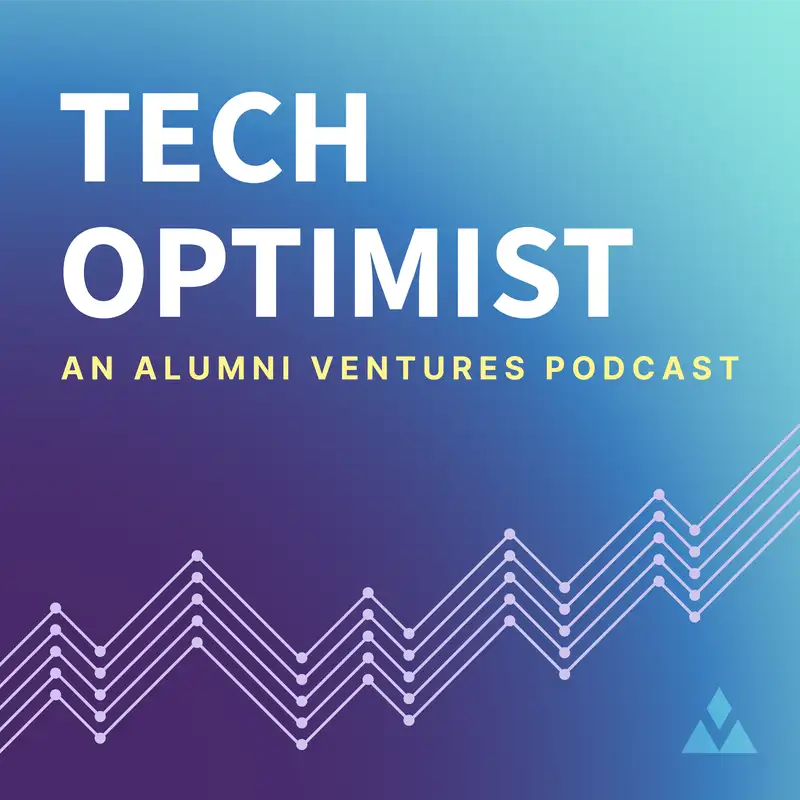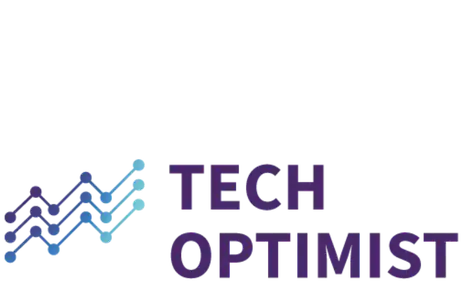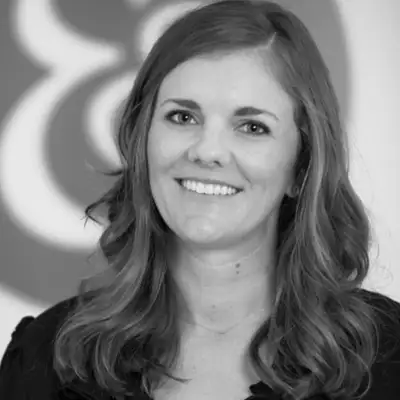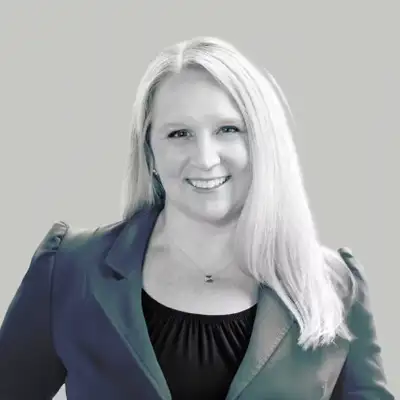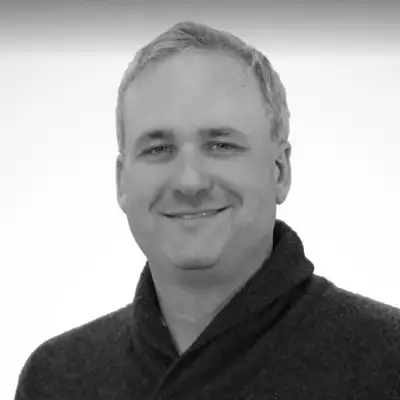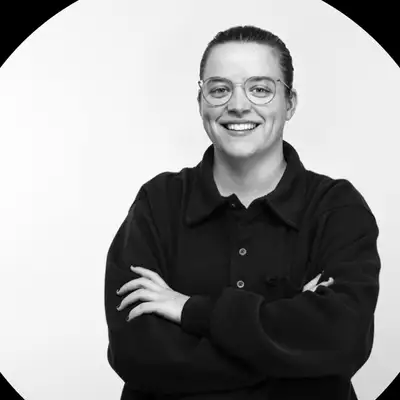#65 - Meet the Startup Bringing Lactation Suites to the Modern Office
Samantha:
This is the Tech Optimist, a podcast brought to you by Alumni Ventures. This is the show where we tell you the stories of tomorrow.
Abbey:
So this enables every single employee in a building to have a safe and private space to pump during the workday ...
Samantha:
That's Abbey Donnell, founder and CEO of Work & Mother.
Abbey:
... and satisfies legal obligations of the employer.
Ron:
I mean, this seems like an issue that's been relevant since women have been in the workplace, right?
Samantha:
And that's Ron Levin, Managing Partner at Alumni Ventures.
Ron:
There's obviously a lot of renewed attention on it later, some of that is for legal compliance reasons, but also, just, I think, more social consciousness.
Samantha:
As far as awareness issues, 43% of parents are unaware or unsure about their legal rights regarding lactation accommodations. So this is where Work & Mother can really help out. And that's me, my name is Samantha Herrick, and I am the guide and editor for this show. You'll hear from me a few times today. All right, so let's get into Work & Mother as a start-up a little bit more. So they as a company provide lactation room services and amenities for working mothers. I think that's awesome, I think in this super modern and innovative sort of work environment that surrounds the classic corporate world, I think this is an aspect that real estate companies, construction companies, development companies, need to apply into the new spaces that they're building.
So as far as the amenities for what these rooms would offer, they're fully equipped lactation suites in commercial office buildings, like I had said. They have an app which is called The Hub, to help mothers navigate work and parenthood together. And in the suites, there are private rooms with workstations, hospital grade breast pumps, cleaning and sanitation supplies, lockers, refrigeration for milk storage, and high-speed internet access, so you can be a mother and work at the same time, which is their whole sort of business model.
And they operate sort of similar to a building gym amenity, so suites are typically located in common areas of office buildings, the services offered as an amenity by landlords or the employer. And users don't pay directly, so costs are covered by building owners or companies that provide said room. So a little bit more about the nitty-gritty stuff about being a startup company, in March of this year, Work & Mother secured a 3.5 million series seed funding round led by Building Ventures, and the funding is being used to expand nationally, launch in new markets, including New York, Boston, San Francisco, Miami, and Chicago. And their aim as a company is, they aim to increase employee retention rates for new mothers. They want to help employers comply with federal regulations like the Pump Act. They want to improve breastfeeding success rates for working mothers, they want to enhance workplace flexibility and support for parents.
And as far as the market, how the market has been receiving them, they've partnered with a lot of major real estate companies in the past. They're recognized as one of the Fast 100 by the Houston Business Journal. Huge achievement, well done. And they're seen as a competitive advantage for office buildings in attracting and retaining tenants. And so, Work & Mother is really positioning itself as a solution to the challenges faced by working mothers, particularly as more employees run to office settings post pandemic, where we're sort of getting back into the swing of the classic 9 to 5 being in a corporate office. So Abbey and Ron have a really awesome conversation for this podcast, and we just can't wait to hear you listen in. So I will be your guide throughout the show, you'll hear from me a few times today, I'll be sprinkling a bit more info in throughout the narrative here today. But without further adieu, here's Abbey to kick us off.
Abbey:
I actually founded the company before I became a mother myself, because I witnessed a lot of close friends really struggling with continuing to breastfeed once they returned to work.
Samantha:
This is an about video Work & Mother had made.
Abbey:
And I knew I wanted to have kids soon. I looked around my workplace, it was an open office floor plan, all glass, mostly men, and I realized there was actually not a way for me to breastfeed if I wanted to keep working. Companies just aren't in the business of breastfeeding, it makes so much more sense to outsource this to someone like Work & Mother, who is. Work & Mother is a network of fully equipped mother suites that enable working moms to continue breastfeeding once they've returned to work and easily satisfies employers' legal obligation of providing a place for them to do so. Before Work & Mother moms are having to load up these pump bags every morning, lug that to work, and then, they have to find their place to pump, unpack it all, assemble it all, and they're also having to parade across their office quite often to use the company break room.
What we're doing is, we're creating a way for them to pump with dignity. Having Work & Mother for your employees actually saves time, it saves time during the actual pumping process because they're able to reserve rooms on our app. And all their equipment is there, we have hospital-grade pumps, which are actually more efficient than personal pumps. Our spaces are designed to create a relaxing environment, which actually stimulates milk flow, it creates a faster pumping experience. And we have workstations, so moms can actually pump hands-free and continue working if they choose to do so. Once you've experienced the Work & Mother suite, you'll wonder how any working mom ever pumped without it.
Samantha:
Now, before we hop into the show, we're going to take a quick break. Hang tight, we'll be right back.
Laura:
Hey, everyone taking a quick break to share more about the Women's Fund from Alumni Ventures. AV is one of the only VC firms focused on making venture capital accessible to individual accredited investors like you. In fact, AV is one of the most active and best performing VCs in the US, and we co-invest alongside renowned lead investors. With the Alumni Ventures Women's Fund, you'll have the opportunity to help us invest in fiery female founders. PitchBook reports female-led startups are more capital efficient and exit faster, yet only receive 15% of all venture capital dollars. We see this as a great opportunity, and we're starting from a position of strength. Alumni Ventures has already invested in over 350 startups founded co-founded, or led by women. So join us in the Alumni Ventures Women's Fund to put your investing capital to back a diversified portfolio of female-led, high-velocity startups, as they change the world. Visit av.vc/funds/womens to learn more. Now, back to the show.
Samantha:
As a reminder, the Tech Optimist podcast is for the informational purposes only. It is not personalized advice, and it is not an offer to buy or sell securities. For additional important details, please see the text description accompanying this episode.
Ron:
Abbey Donnell, founder and CEO of Work & Mother, great to have you with us here today on the Tech Optimist podcast. We use this platform to share stories of how technology and innovation are improving people's lives, and we love to feature founders who are on a mission to really fill important needs in the market and bring important progress to the world, and I can think of no one better than yourself as a representation of this through what you're doing at Work & Mother. So why don't you just give us a quick introduction on who you are and what the company is all about?
Abbey:
Sure, well, thanks again for having me. I'm Abbey Donnell, founder and CEO of Work & Mother. Work & Mother provides fully equipped and fully operated mother's suites for commercial real estate at scale, so this enables every single employee in a building to have a safe and private space to pump during the work day and satisfies legal obligations of the employer. With our newer offering, Work & Wellbeing, we can also accommodate other needs like mental health, prayer, meditation, telehealth, so any kind of personal need during the workday where you need a safe, private space. We're based in Houston and growing across the country quickly.
Ron:
Yeah, amazing, I'm definitely going to come to that. So what is it that Work & Mother offers that a typical office could just like, okay, we're going to clear out this one room and make it a lactation room? What does Work & Mother do that's different?
Abbey:
Yeah, so a few things. So one of the most common ways that companies, I guess, accommodate new mothers, is to provide a multipurpose wellness room. Sometimes it's a glorified closet, unfortunately. But one of the problems that was occurring a lot with this approach was a lack of true privacy. So when you have this kind of room that's right off the main room of the office, it's being used as a catch-all for all things requiring privacy, so first of all, it can be hard to actually get in there when you need to pump. And pumping's not something that you can just put off, and so, it can be hard to access it.
And on the flip side, everyone often has access, so even if the door locks, which they don't always, many people have the keys or access badges, and so, we get a lot of calls all the time for people that have gotten walked in on, or a lot of issues with harassment around the room itself and what it's being used for. One of the other problems is, if the room itself doesn't have proper cleaning and sanitizing, running water and refrigeration, then employees are having to carry all of their pump parts and milk to the company break room and finish their process there, which is where, a lot of times, additional harassment happens.
Samantha:
Yeah, so unfortunately, Abbey is very right on this one. As far as workplace culture goes, with sort of lactation and new mothers, is lack of support, so some women feel guilty or pressured by leadership or other sort of people of prominence within the building due to time spent pumping, which is super unfortunate, where this is a very natural sort of thing that women have to go through or choose to go through with their children. And as far as awareness issues, 43% of parents are unaware or unsure about their legal rights regarding lactation accommodations, so this is where Work & Mother can really help out.
In most office spaces around the country, about one in three parents report not having reliable access to dedicated lactation spaces at work. The locations are inconvenient, there are insufficient number of rooms per building, per employee, that actually needs them. Only 33% of these facilities have refrigerators for milk storage, only 43% of these rooms in the country have sinks for cleaning, and then, only about 12% of them around the country have computer access, so reliable internet and sort of a space to actually get your work done.
Abbey:
And so, by Work & Mother, by having a third party space and management platform, you not only create true privacy, you have all of the equipment, so there's no forgetting a part, or a part not working and you have to leave work in the middle of the workday to solve for that, everything is on site. And then, it's anonymized booking, so you're able to truly show up to work, focus on your job, not have to worry about all of this extra equipment, use the facilities with all the equipment when you need to, and get back to work without any disruption in your day.
Ron:
Yeah, and I mean, this seems like an issue that's been relevant since women have been in the workplace, right? There's obviously a lot of renewed attention on it later, some of that is for legal compliance reasons, but also, just, I think, more social consciousness. But why right now? Why is the time right now for Work & Mother to be growing?
Abbey:
Yeah, a few reasons. One, COVID really changed the landscape for a lot of things with regards to the office, and one of them was that breastfeeding moms were succeeding suddenly, because they weren't in the office every day, and it became important to them, it became important because of antibodies, especially, and the AAP also came out and increased their breastfeeding guidance. So what happened is, when you had people coming back to work, that was a priority for them, they wanted to be able to continue that. Additionally, about two years ago now, the Pump Act passed, and that took existing federal legislation and strengthened it, really protecting moms in the workforce and stepping up the requirements of employers.
So now, all employers have to provide a space, it cannot be a bathroom, and it has to be free from intrusion. And if they don't, they risk penalties and fines, and ultimately, litigation. And so, there's a few different ... There's the legislative tailwinds right now, there's more awareness from all sides on the issue. And from the commercial office standpoint, landlords and employers are understanding that if they are going to have people back in offices, they have to compete with people's living [inaudible 00:15:03], not just with other buildings, they have to compete with the comforts of home. And so, they are doing more to reduce barriers of getting people into office, and this is one of those things that they are prioritizing.
Ron:
Yeah, expand on that, what are employers learning about the ability to hire, retain working mothers? What is the impact on the workforce as a result of being able to have lactation suites or similar facilities?
Abbey:
Yeah, well, health and wellness and parental support are some of the highest priorities for the modern workforce, especially millennials and Gen Z, and so, when they're looking at where they will work, this is something that is on their radar, whether or not they have a need immediately or in the future. We got a call from a law firm that, they'd been really pursuing this high profile recruit, and she visited the office and specifically asked what they did to support mothers. And they did have a multipurpose room, but what most often was happening is, they were putting up paper or a curtain on the glass walls of offices. And she went to their competitor, who provided robust maternal support.
And so, we just got another testimonial from an employee who, having the Work & Mother suite in her building was a key factor in choosing which employer she went with. So we're seeing it make a big difference. Some of our buildings where ... We have companies with multiple locations, and their employees, if it's in the same market, they'll request a transfer to the office that has the Work & Mother suite during their time postpartum. So it's really influencing people returning to the office and to an employer, in general.
Ron:
Yeah, and are you mostly working with kind of large offices? Do you work with larger office managers? Is it the individual tenants? Who are your customers?
Abbey:
Yeah, great question, and all of the above. One of the great things about how we've set up our solution is that it's tailorable to the size of the building or the employer. So we have locations in buildings that are as small as 200,000 square feet, we have locations in buildings that are campuses, we've got a three building campus that's 3.2 million square feet, and then, we are doing more and more directly with employers and tenants, as well. So we've got a robust offering and a wider offering depending on what the needs are and what the location allows.
Ron:
Great. And stepping back to the origin story, talk about, what was your motivation to start the company? Obviously, there's a big need that you saw, but what kind of drove you personally into wanting to help solve this challenge?
Abbey:
I definitely didn't see this coming in my future at the time, but as I mentioned, I was working in marketing and brand strategy, I was also getting my MBA at the time, so I was working and back in school. And it was life timing, everyone around me was starting to have kids and I wasn't a mom yet, but as I was watching those around me cope with returning to work, the conversation seemed to always revolve around trying to pump at work and how impossible it was. And I was hearing stories of people being told to use conference rooms, which, if anyone's ever seen a conference room, it's really not set up for such an intimate task. People roaming the office during lunch to see ... If they worked in a cube, they were trying to find an empty actual office with a door to commandeer, people apart wouldn't work and they'd have to run home.
So I was hearing all these just awful stories. And I didn't have kids yet, so I had nothing to contribute, was just listening, and I was like, this sounds absolutely awful, I want to have kids soon. I looked around my own office, open floor plan, glass walls, and even though my company was very supportive culturally, it's a really great company, but I was like, physically, there's no way I can do this here. And so, that kind of got the wheels spinning. And one of my clients was a real estate investment firm, so I was paying attention to real estate trends, I was aware of the amenitization of space and more shared space opportunities. And I used it as a case study in one of my entrepreneurship classes, and it sort of snowballed. I was getting interest from employers who were trying to recruit and retain women, I was getting interest from employers who really just wanted to check the legal compliance box. And so, I pitched my client, Limestone Investments, on this concept, and thankfully, they were supportive and we piloted at the very end of 2018.
Ron:
Great, so you were able to essentially go to market with a first sort of pilot customer. Did that mean you kind had revenue almost day one, or did you have to build some product first?
Abbey:
Yes and no. Learned a lot of lessons about commercial real estate, I thought I knew a certain amount. So when we did the pilot, it was a slightly different model. They were like, okay, we love this, we want to partner with you on it, but before we make it a full amenity for the building, we want you to demonstrate demand. So I had to really sign up individual tenants. And so, the positive thing was that we started attracting tenants from neighboring buildings. I mean, we had tenants from buildings across the street enrolled, we had some from a neighboring WeWork enrolled even, though they had, technically, a mother's room or wellness room. So we were pulling interest from blocks away, which was great, and it got us our second location with Brookfield Properties, a major real estate committee in Houston, but that second location opened to a completely empty building just after COVID.
So it was definitely a bit of a gut punch when we're just like ... We just are trying to open, and the doors of the building are closed. So it was a little bit of a slog at the beginning, but what was really fortunate about that is, that momentary pause gave us some time to refine our model itself and our technology. And so, the minute people started to go back, we actually helped landlords make sure the spaces, they had clean, sanitary, because then, the priority was like, hey, we really do need sanitary dedicated spaces for them to come back, we need them to come back carefully. And we had really built out our digital service model, as well, with support resources and the management platform, so it positioned us well once people started going back to then start growing very quickly.
Ron:
Yeah, and just to pick up on that, here at Alumni Ventures, we tend to focus on highly scalable, technology-driven businesses. On the surface, it may not seem like you're kind of a tech-driven business, but behind the scenes you are. Maybe you can talk a little bit about what you've built and what you're working on now.
Samantha:
This is actually a perfect segue, so on Work & Mother's YouTube channel, they have this really well done event video from their New York City launch a few months ago, kind of expanding out of their normal realm of the South in Texas, and came over to the East Coast to help out an office building, equip out Work & Mother for their employees. So this video is awesome, there's a lot of really powerful and really influential women that are on this panel at this event. There's some people from L'Oreal there, and the list goes on. So before we start to talk about what Work & Mother has built, I want to show you. So you'll also get the audio version from this video right here in the podcast, but if you want to see the video, hop over to our YouTube channel or our LinkedIn, @alumniventurestechoptimist, and you'll see the video for yourself there. So really quick, we're going to do an ad, and then, we're going to hop into that video, and then, we're going to finish off the interview. So hang tight, we'll be right back.
Speaker 5:
Do you have a venture capital portfolio of cutting-edge startups? Without one, you could be missing out on enormous value creation and a more diversified personal portfolio. Alumni Ventures, ranked a top 20 VC firm by CB Insights, is the leading VC firm for individual investors. Believe in investing in innovation? Visit av.vc/foundation to get started.
Vanessa:
Thank you so much for joining us as we celebrate Women's History Month, International Women's Day, and of course, the launch of Work & Mother's first New York location. On average, 24% of women leave the workforce in the first year after giving birth. We can and we must do better.
Abbey:
I was hearing all of these stories about women crouched down in IT closets, being told to use conference rooms, which, I don't know if you've ever seen a conference room, but it's a really strange place to try to pump during the workday. I either need to become a whole lot more comfortable with public nudity or I need to quit, and quit breastfeeding or quit working. And I didn't want that to be the question for any woman.
Vanessa:
I was just blown away by their mission, they are changing the way we support mothers when they return to work.
Savannah:
It's never not a challenge, I think, when you're a woman and you're trying to figure out a new way of doing something.
Stephanie:
So there's a huge opportunity for us all to be part of flipping the script.
Simmone:
It's also the time to participate in your own advocacy, not just for yourselves, but also, for your colleagues.
Zara:
And get the men advocating on our behalf, as well. People don't need to look like you to advocate for you.
Stephanie:
All of you, by the way, here, came from a pregnant person, so you will know and work with someone who has gone through this.
Simmone:
I mean, kudos to Work & Mother for building these spaces, which, trust me, eventually, too, can also serve as menopause spaces.
Vanessa:
I do not think that these are nice-to-haves, they are must-haves for so many reasons. It's good, one, because it's the right thing to do, but it's also great for retention. There's so many reasons for it.
Jules:
I am blown away by this room and this panel and the conversation, and proud to call this our flagship New York City Work & Mother suite.
Abbey:
Raise a glass to changing the landscape for working parents. Yes, I do always have to preface, we do not do the build out, and we do not have a lease, so we have, essentially, a virtual platform that we use to operate these on behalf of the landlord or the employer. So we do have an implementation phase at the beginning where, if they don't have a space already, we hand over our spec and build book so they can plug and play it. And we can provide support during that time, anything from fit well and well certification credits to ESG and DEI considerations, so we can provide all of that support and planning upfront.
But once they're ready for us to come in, we bring in hospital grade equipment, all of the supplies, the door access system, and operating platform. So we manage everything from enrollments and approvals, waivers, door access, and bookings. We do virtual orientations. And then, where we really help move the needle is that we have tenant communications toolkits, so all of the HR policies, all of the mother friendly workplace seals, all of the things every company needs for their handbooks. And then, we have the hub of support resources, so things that go beyond the physical spaces, health and wellness providers, we have a partnership with Calm, so you've got the meditation aspect, and some physical therapy and return to work coaching. So we provide this robust solution that is more than the four walls, and almost all of it is virtual.
Ron:
Great, and I want to come to sort of how investors perceive the business, but what have been your growth plans? Did you set out to grow to become a national company? Did it happen kind of organically? How are you thinking about your growth right now?
Abbey:
Yeah, no, we definitely set out to become a national company, we want there to be a Work & Mother suite in every single building. I think the fact that there's legislation that falls under HR is great, it's a really great step, but if moms are going to truly be free to move about the world, having it in an office versus in buildings, it only goes so far. And we're starting to see that, we're starting to see the more permanent physical solutions in airports, in office buildings, of course, but in every type of building. So we intentionally set out to be this go-to resource for all things work and parenthood. What's been the more organic growth piece is that we now are including wellness and wellbeing in that. So what happened is, we started getting really great feedback and impacts from our locations, and our clients came to us and said, hey, we love this, it's working really well.
Some of our tenants are also asking for help addressing mental health or meditation and prayer in the workday, is that something you can help us with? And so, that's where our work and wellbeing concept came about. So we're able to offer the mother suites, Work & Mother, and keep them dedicated for that purpose from the legal compliance standpoint, but then, also offer these spaces with tech integration and virtual support resources, so that, if you need to take a telehealth appointment during the day, you've got a space to do that. No one wants to take a therapist appointment at their desk with their coworkers sitting right on the other side of a paper thin wall, and so, what we realized is how much more these needs for safe third spaces during the day with the integrated support resources extend far beyond breastfeeding, and that's been a really welcome side of the growth, as well.
Ron:
Yeah, I can imagine, I mean, there was even a little bit of a trend, I don't know if it still is, of sort of the midday office naps and nap breaks, and hustle and bustle, get away for 20 minutes. It could be used for that, you could do a massage chair or something. A lot of different ideas, right?
Abbey:
I've never managed to squeeze in those midday naps, but I wish I was on that train.
Ron:
Exactly, exactly. But absolutely, a lot more, I think you could do with this space if it's otherwise sort of unutilized at points during the day. And so, you are sort of around the country now, is that right? How many cities are you in? How many customers do you have?
Abbey:
Yes, we are in eight different markets now, Houston, Austin, Dallas, Chicago, Boston, New York, DC, Miami. And then, we've got some new markets in particular on the West Coast that are in development, so we can serve any market. So just shameless plug out there, if you're listening and have a location that is not located one of those markets. But yeah, we are growing nationally, and we've started to attract some interest beyond our borders, as well.
Ron:
That's great. Do you consider yourself a social entrepreneur? If you talk to people, do you think, is this meant to be a double bottom line impact- driven, or how do you think about running a scalable for-profit business that also has a social mission?
Abbey:
It's so rewarding, because I think when I started the company, I wasn't thinking of it as a social impact cause or not, it was, I saw a problem, and I saw a way that I thought it should be solved. And I actually tried not to pursue it, I tried to go a safer, more secure route, but I couldn't ignore the itch and the pull. So I didn't evaluate it that way at the beginning, but it makes the grind so fun because it is so rewarding. The number of testimonials we get, the number of moms that reach out to us, the number of HR that reach out, have been so positively impacted by this. 40% of families have the mom as a breadwinner, which is an impossible situation to be in if you're also trying to care for your baby and go back to work. And so, it's really rewarding to get to do something that feels good and that has an impact, but that can be very profitable at the same time.
Ron:
Absolutely. And you've been growing, you've raised outside capital, obviously, you've raised venture capital since we participated in one of your recent rounds. Can you just tell us a little bit about your fundraising journey and what that's been like?
Abbey:
Yes, and thank you. Yeah, so the fundraising journey has been interesting, especially given, I think people, as you mentioned earlier, at first think this is a very brick and mortar ... I think it's not necessarily fitting into a software box, but once we clear that hurdle, we've been very fortunate to have some really great investors. So we raised our seed round last year, which is when you all participated, and brought on some really great groups, Building Ventures, which is proptech, the Artemis Fund, which is women-focused and future of work, and [inaudible 00:34:23] Capital, which is a lot more healthcare-focused.
So we've got a nice, well-rounded group, in addition to you all and some of our other angels. So yeah, we have had the fortune of raising during some pretty tough times, whether it was our very first round during COVID, and all the offices were closed, and we're pitching something that is going into those closed offices. Or, last year was a tough environment, as well, so I am very proud of our team for what we've been able to accomplish, and the fact that we have, despite hard market circumstances, brought in some really great groups.
Samantha:
So now, we are at the point in the episode where Ron does a really nice job of shifting the narrative for the show and for this really special episode with Work & Mother. Now, they sort of take a personal note in their conversation, right? Ron asks Abbey about her personal background and how it feels to be a mother and be an entrepreneur at the same time. And she talks about some prize, some surprises that came along the way, and she talks about the really honest side of being an entrepreneur and being a founder and a CEO that I think is really impactful and it's a really cool part of the discussion. So we're going to round off the show with those few questions and that end of the interview, and then, we're going to wrap up. But this is my last tech note for the episode, and yeah, enjoy the rest of the episode, and I will talk to you next time.
Ron:
That's great. And [inaudible 00:36:08] like a little more on your own personal journey to becoming a founder, did you always kind of know you wanted to be an entrepreneur since you were a kid, or was there a light bulb moment, or what set that off for you?
Abbey:
I do think in some ways, the writing was on the wall. When I was young, I was that kid out there having lemonade stands. I sold my paintings out of my red wagon from door to door, which, at this point is embarrassing, but not as embarrassing as when I sold tickets to my plays to our neighbors so they would come over and watch my performances. So everything I was doing was very entrepreneurial from an early age. I definitely thought I would run my own business, but I thought it would be in advertising and marketing. So this was definitely an unexpected path, but at the same time, when you look back at certain life events, that's kind of moments that stuck with you, it, in some ways, feels inevitable that I'm here.
Ron:
And what's been the sort of the biggest challenge, or maybe, unexpected surprise you've had along the way?
Abbey:
I think managing a hybrid team across different time zones and different ... We have a lot of really awesome talent that came from the commercial real estate world, which is a lot of bigger institutions. And working in that environment is very different than working on a small startup team, and so the challenges in really building a meaningful company culture partially, virtually, and across a lot of different past experiences, is more challenging than I thought, but I have a really great group of advisors and people around me, so it's something we're very conscious of and dedicate a lot of time and energy to.
Ron:
Yeah, great. Yeah, and on the flip side, any positive surprises or things going better than you may have even expected them to?
Abbey:
I mean, on that same note of people, I am constantly blown away about the number of people who are excited about what we're doing and just want to help, people who have connected, who have supported. Some people that are unexpected have brought me into rooms where I'm like, how am I here? And so, I would even say, the difference in support and engagement from men in real estate from 2017, when I first started thinking about it, in 2018, when I launched, to now, has been really nice to see. At first, it was a little bit of like, I don't know about this problem, I trust you that it's a problem, just go solve it, to now being like, I understand this problem because of my family or because of my direct involvement with my kids and my wife. And so, we've had a lot of really awesome support from all sorts of allies out there, which has been great.
Ron:
Amazing. And what's your long-term vision? How big of a business do you see this becoming?
Abbey:
Big. We want to be the go-to resource for all things work, parenthood, and wellbeing. We want there to be a Work & Mother and Work & Wellbeing suite in every single commercial building and really build it as a recognizable brand, globally.
Ron:
Amazing. Yeah, and now that you have a few lessons learned, you've been at this a little while, as you talk to maybe aspiring entrepreneurs, founders who are getting in now with ideas, what kind of advice do you like to share? Are there any of cautions that you like to throw at them, or how do you talk to other entrepreneurs?
Abbey:
Yeah, I think, one, making sure you've got the passion there. It really does take a level of passion and dedication during the hard times to make sure you keep going. I could not do this if I didn't have a spouse who is incredibly supportive, and a lot of family, both paid and non-paid, help with kids, because while I didn't have them before I started, I do have them now, and the juggle is very real. And then, I think my other piece of advice is, in the beginning, when you don't have any money and it feels like you've got to just be scrappy, there are certain things like company structure and legal and stuff that you should just spend the money on it and do right the first time.
Ron:
Yeah, no doubt, absolutely, good advice. So last question, so we've got a terrific community audience for this podcast, within our group, a lot of folks who are interested in entrepreneurship, venture capital, folks who are connected, perhaps, to real estate landlords or just future of work, whatever it might be, any asks for our community, and any reason why folks might reach out to you that could be helpful as you continue on your journey?
Abbey:
Yes, so my first ask would be, help us build the awareness, so bring Work & Mother to the attention of your company or your landlord. If you don't have a mother's room, we'll come in and fix that. If you have one, but it doesn't have equipment, supplies, or support resources for new parents, then we can help with that, too, whether you need it right now. And actually, it's even more powerful if you don't, if you can bring it up on behalf of other workers who may need it. So my first ask would just be helping build that awareness piece. And then, as far as reaching out, we will be expanding the team a bit more in the coming months, so stay tuned. And we will also be launching some exciting new brand developments, so I would encourage anybody that is passionate about what we're doing to keep an eye on our announcements and reach out if they'd like to join the team.
Ron:
Awesome, thank you so much, Abbey Donnell, founder and CEO of Work & Mother, it's been a real privilege to chat with you and go a little bit deeper on the story. So thank you for joining us today, we really appreciate it.
Abbey:
Thank you so much for having me.
Ron:
Take care.
Samantha:
Thanks again for tuning into the Tech Optimist. If you enjoyed this episode, we'd really appreciate it if you'd give us a rating on whichever podcast app you're using, and remember to subscribe to keep up with each episode. The Tech Optimist welcomes any questions, comments, or segment suggestions, so please email us at info@techoptimist.vc with any of those, and be sure to visit our website at av.vc. As always, keep building.
